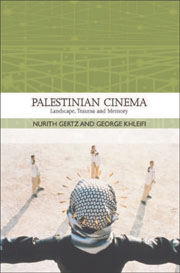Book contents
- Frontmatter
- Contents
- TRADITIONS IN WORLD CINEMA
- Dedication
- Introduction
- 1 A Chronicle of Palestinian Cinema
- 2 From Bleeding Memories to Fertile Memories
- 3 About Place and Time: The Films of Michel Khleifi
- 4 Without Place, Without Time: The Films of Rashid Masharawi
- 5 The House and its Destruction: The Films of Ali Nassar
- 6 A Dead-End: Roadblock Movies
- 7 Between Exile and Homeland: The Films of Elia Suleiman
- Conclusion
- Epilogue
- Bibliography
- Filmography
- Index
2 - From Bleeding Memories to Fertile Memories
Published online by Cambridge University Press: 05 August 2013
- Frontmatter
- Contents
- TRADITIONS IN WORLD CINEMA
- Dedication
- Introduction
- 1 A Chronicle of Palestinian Cinema
- 2 From Bleeding Memories to Fertile Memories
- 3 About Place and Time: The Films of Michel Khleifi
- 4 Without Place, Without Time: The Films of Rashid Masharawi
- 5 The House and its Destruction: The Films of Ali Nassar
- 6 A Dead-End: Roadblock Movies
- 7 Between Exile and Homeland: The Films of Elia Suleiman
- Conclusion
- Epilogue
- Bibliography
- Filmography
- Index
Summary
A manifesto, published in 1973 by the Photography Section, Mustafa Abu-Ali's Palestinian film group, articulates the goals of Palestinian cinema thus: “to reveal the actual reasons for [the Palestinians'] situation and to describe the stages of the Arab and Palestinian struggle towards the liberation of [their] country” (Hennebelle and Khayati, 1977). The writer of the manifest maintains, furthermore, that these goals require the finding of a new aesthetics to express the new contents, and a total commitment of cinema to the Palestinian revolution and Arab causes: “The Palestinian Film Group views itself as an integral part of the institutions of the Palestinian revolution” (ibid.). The Palestinian national struggle is associated here with Marxist-Leninist revolutionary ideology, dominating the thought of the Palestinian leadership during those years, as well as with the artistic expressions of this ideology, as they were formed by Socialist Realism. The Palestinian cinema of the third period, created in the 1970s in exile – in Jordan and particularly in Lebanon – responded, to a great extent, to these poetics and this ideology, and to the role designated to cinema by the organizations that supported it: constructing the Palestinian national narrative as part of an international revolutionary struggle.
- Type
- Chapter
- Information
- Palestinian CinemaLandscape, Trauma and Memory, pp. 59 - 73Publisher: Edinburgh University PressPrint publication year: 2008



